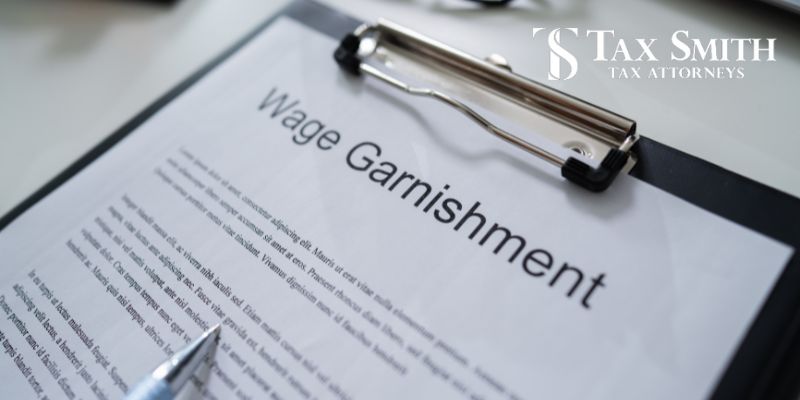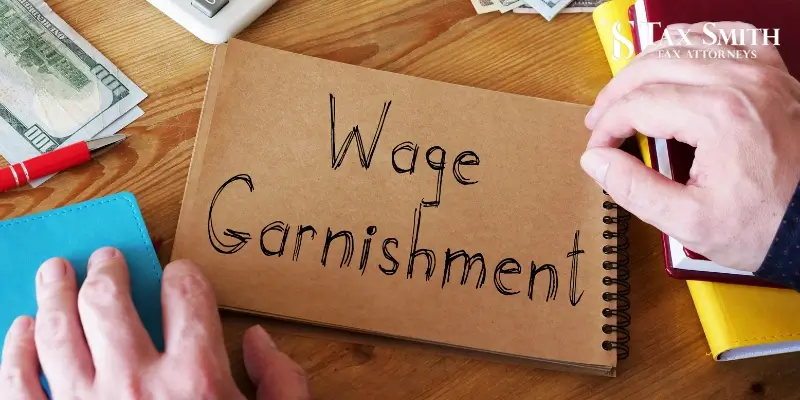1548 The Greens Way – Ste. 4 Jacksonville Beach FL 32250
Jacksonville Wage Garnishment Lawyer
Jacksonville Wage Garnishment Attorney
When you owe money on your taxes, the IRS does not hesitate to collect it in whatever manner possible. Although the tactics start as reminders and notices, they can quickly escalate to tax liens, levies, and similar methods. Wage garnishment is one tool that the IRS frequently uses to collect the money that a taxpayer owes.
If you owe the IRS money, it is important to seek legal representation. An IRS tactics attorney in Jacksonville can provide you with options to resolve your tax issue and avoid wage garnishment. A qualified attorney may even be able to negotiate the amount that you owe to the IRS. Our team at TaxSmith, LLC, is here for you, ready to protect your wages and help you find a path to financial relief.

TaxSmith, LLC: Your Jacksonville Wage Garnishment Attorneys
When you have a tax problem of any kind in Jacksonville, our team at TaxSmith, LLC, is here to help. With many years of specific experience in tax law, our attorneys provide reliable, straightforward legal representation. We help individuals and families who are facing wage garnishment, tax liens, tax levies, and other challenging tax scenarios.
Our qualified tax attorneys approach every client with patience, respect, and kindness. We know that taxes are frustrating and confusing, and we are here to make you feel confident and supported. When you work with us, you can feel confident that you have explored all available options for your tax situation. We can help you choose the route that works for your unique situation.
For comprehensive tax legal services in Jacksonville, trust TaxSmith, LLC.
What Is Wage Garnishment?
When a taxpayer is behind on their taxes or owes money to the IRS, the IRS takes action to collect the money that they are owed. Wage garnishment is one method that they may use to recover the debt via the taxpayer’s income.
To perform wage garnishment, the IRS notifies your employer that you have a tax debt that has not yet been paid. Your employer is then required to take a certain percentage of your paycheck and send it to the IRS to fulfill your debt. This may continue for the duration of your debt. The IRS may also take harsher action and repossess your home or other assets via a bank levy. The IRS cannot garnish more than 25% of your wages in this process.
If you are self-employed, the IRS can use wage garnishment on your business’s accounts receivable. This can affect your business relationships and reputation going forward. If you rely on military retirement or social security benefits, the IRS may take up to 15% of these payments via wage garnishment.
Resolving Wage Garnishment
The most effective way to resolve a tax issue is to pay your debt in full. The same is true if you are experiencing wage garnishment. The IRS will continue to garnish your wages until they have received the entirety of what you owe.
However, you may have your attorney negotiate a settlement with the IRS as part of a strategy to get out of tax debt. A tax settlement is an agreed-upon reduced price based on your income, assets, debts, and other factors. Tax settlements benefit the IRS because they get some of their money, while they benefit the taxpayer by reducing the amount that they owe. If you come to a tax settlement, the wage garnishment should come to an end.
You can stop wage garnishment with the help of an experienced tax attorney. We can outline all your options and help you choose the method that most benefits you and your financial situation. There may also be other options available to you besides the ones listed here.
Why Do I Need a Wage Garnishment Attorney?
Although it may seem counterintuitive to invest money in an attorney when you already owe money to the IRS, doing so can actually help your financial situation. When many people address wage garnishment, they do so without understanding the options that they have. This results in poor decision-making, and you may even end up paying more than you should for your circumstances.
A wage garnishment attorney helps you explore all your options. They can ensure that you choose the one that resolves your problem for the least amount of money. In this way, hiring an attorney can ultimately save you money.
Wage garnishment and tax law are both confusing topics. Attempting to navigate these topics alone causes additional stress in a situation that is already fraught with anxiety. Trust an attorney to help you through this difficult time.
Levies
Wage garnishment already limits your income and may jeopardize your financial security. Nevertheless, there are additional actions that the IRS may take in conjunction with wage garnishment.
Levies are an indication that the IRS is taking action to repossess your assets. This is distinct from a lien, where the IRS claims ownership of your assets.
A bank levy account allows the IRS to take money out of your bank account to satisfy the debt that you owe. For this to occur, the bank has 21 days to hold your funds, including funds you have on deposit, to give to the IRS. They may hold up to the total amount that you owe.
During this 21-day period, your attorney has the opportunity to resolve your tax issue. This can result in your funds being released back into your account. It is important to act quickly when this happens. That way, you can retain as much of your hard-earned savings as possible.
It is also possible for the IRS to levy other assets, such as your home, car, and personal possessions. Our team at TaxSmith, LLC, has significant experience with levies of all types. We can work swiftly to resolve your tax issue before the IRS does irreversible damage to your financial situation.
Retaliation and Wage Garnishment
Because wage garnishment involves your income, your employer will be made aware that you have an outstanding debt to the IRS. This is information that would otherwise be private in most situations.
It is important to understand that your employer cannot retaliate against you for a single wage garnishment. This means that they cannot fire you or treat you differently because the IRS is taking funds out of your paycheck. They also cannot retaliate because of the information they are privy to in your garnishment case.
However, your employer may take retaliatory action if a single creditor is garnishing your wages to pay for multiple debts. They can also act if you have more than one creditor garnishing your wages. If your employer fires you for this, you may find yourself unemployed and in immense debt to multiple creditors.
Because of the potential job loss, it is very important to hire an attorney to help you. We can develop solutions that help you avoid serious consequences.

FAQs About Jacksonville, FL Wage Garnishment Law
How Do I Fight Wage Garnishment in Florida?
The most straightforward way to combat wage garnishment is to pay your debt in full. When you do this, the IRS has 30 days to process your payment, and then all action against you should cease. However, if you cannot afford to pay the entire amount, your attorney may be able to negotiate a payment plan or a smaller tax settlement. This can reduce the risk of more severe IRS actions.
What Is the Law for Garnishment of Wages in Florida?
Florida law states that creditors cannot garnish the lesser of more than 25% of a person’s wages, or 30 times the minimum wage. The law states that 25% of “disposable earnings” can be garnished. However, it considers disposable earnings to be gross pay. Most people have their wages garnished because of federal debts. Nevertheless, it is possible for state tax debt to lead to wage garnishment as well.
How Can I Settle a Garnishment From Debt?
Your first step should be to pay off the entirety of your debt, if possible. This will stop garnishment action and prevent other forms of debt collection as well. If this is not possible, you may be able to negotiate a smaller settlement with your creditor. If you have extenuating circumstances, you may be able to file for an exemption. This would stop harassment and debt collection actions. As a last resort, you may be eligible to file for bankruptcy.
Can I Sue for Illegal Garnishment?
Yes. There are specific rules and regulations that creditors must follow if they take wage garnishment action. If a creditor violates these laws, you have the right to take legal action against them. You may even sue a creditor if you owe them money but the action they took to retrieve it was illegal. To file a claim against a creditor, it is important to speak with a qualified wage garnishment attorney first.
Trust TaxSmith, LLC
Our team at TaxSmith, LLC, has been fighting wage garnishment for many years. We are ready to find creative solutions to your tax problems that fit within your lifestyle and means. No other area law firm has the same level of experience as our team.
For more information about how we can help you, please contact TaxSmith, LLC.
Locations We Serve
- Alabama
- Arizona
- California
- Colorado
- Connecticut
- Delaware
- District of Columbia
- Florida – HQ
- Georgia
- Idaho
- Illinois
- Indiana
REQUEST A CONSULTATION
Please fill out the Contact Request Form and a Tax Attorney/Paralegal will call you
to discuss legal representation or to schedule your free initial consultation





